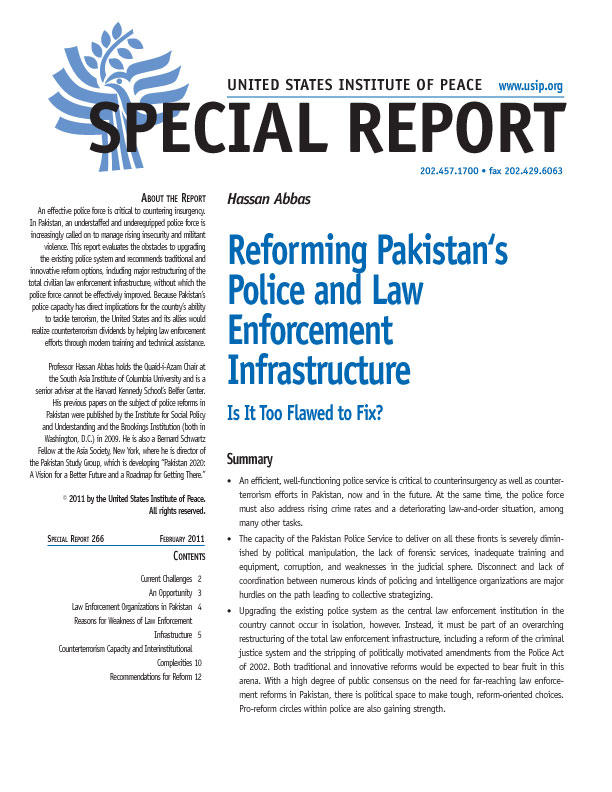Reforming Pakistan‘s Police and Law Enforcement Infrastructure
An effective police force is critical to countering insurgency. In Pakistan, an understaffed and underequipped police force is increasingly called on to manage rising insecurity and militant violence. This report evaluates the obstacles to upgrading the existing police system and recommends traditional and innovative reform options, including major restructuring of the total civilian law enforcement infrastructure, without which the police force cannot be effectively improved.

Summary
- An efficient, well-functioning police service is critical to counterinsurgency as well as counterterrorism efforts in Pakistan, now and in the future. At the same time, the police force must also address rising crime rates and a deteriorating law-and-order situation, among many other tasks.
- The capacity of the Pakistan Police Service to deliver on all these fronts is severely diminished by political manipulation, the lack of forensic services, inadequate training and equipment, corruption, and weaknesses in the judicial sphere. Disconnect and lack of coordination between numerous kinds of policing and intelligence organizations are major hurdles on the path leading to collective strategizing.
- Upgrading the existing police system as the central law enforcement institution in the country cannot occur in isolation, however. Instead, it must be part of an overarching restructuring of the total law enforcement infrastructure, including a reform of the criminal justice system and the stripping of politically motivated amendments from the Police Act of 2002. Both traditional and innovative reforms would be expected to bear fruit in this arena. With a high degree of public consensus on the need for far-reaching law enforcement reforms in Pakistan, there is political space to make tough, reform-oriented choices. Pro-reform circles within police are also gaining strength.
About the Report
An effective police force is critical to countering insurgency. In Pakistan, an understaffed and underequipped police force is increasingly called on to manage rising insecurity and militant violence. This report evaluates the obstacles to upgrading the existing police system and recommends traditional and innovative reform options, including major restructuring of the total civilian law enforcement infrastructure, without which the police force cannot be effectively improved. Because Pakistan’s police capacity has direct implications for the country’s ability to tackle terrorism, the United States and its allies would realize counterterrorism dividends by helping law enforcement efforts through modern training and technical assistance.
Professor Hassan Abbas holds the Quaid-i-Azam Chair at the South Asia Institute of Columbia University and is a senior adviser at the Harvard Kennedy School’s Belfer Center. His previous papers on the subject of police reforms in Pakistan were published by the Institute for Social Policy and Understanding and the Brookings Institution (both in Washington, D.C.) in 2009. He is also a Bernard Schwartz Fellow at the Asia Society, New York, where he is director of the Pakistan Study Group, which is developing “Pakistan 2020: A Vision for a Better Future and a Roadmap for Getting There.”



